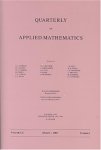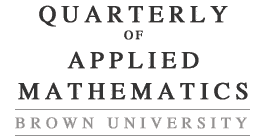A wedge-flow approach to lubrication theory
Author:
W. E. Langlois
Journal:
Quart. Appl. Math. 23 (1965), 39-46
MSC:
Primary 76.34
DOI:
https://doi.org/10.1090/qam/176707
MathSciNet review:
176707
Full-text PDF Free Access
Abstract |
References |
Similar Articles |
Additional Information
Abstract: A theory of fluid-film lubrication is developed from an assumption of local wedge-flow, rather than local parallel-channel flow. This leads to a generalization of the Reynolds lubrication equation governing the pressure. A refinement of lubrication theory does not necessarily follow: unlike the parallel-channel case, the stress field may differ significantly from an isotropic pressure, so that imposing ambient conditions on the bearing periphery does not always yield boundary conditions for the pressure equation. If the bearing slope differs appreciably from zero only in the film interior, consistent boundary conditions are once more available.
- W. E. Langlois, Slow viscous flow, The Macmillan Co., New York; Collier-Macmillan Ltd., London, 1964. MR 0173436
A. A. Milne: A contribution to the theory of hydrodynamic lubrication: A solution in terms of the stream function for a wedge-shaped oil film; Wear 1, (1957) 32
W. A. Gross: Gas film lubrication; Wiley, 1962; pages 138–141
W. E. Langlois: Slow viscous flow;Macmillian, 1964
A. A. Milne: A contribution to the theory of hydrodynamic lubrication: A solution in terms of the stream function for a wedge-shaped oil film; Wear 1, (1957) 32
W. A. Gross: Gas film lubrication; Wiley, 1962; pages 138–141
Similar Articles
Retrieve articles in Quarterly of Applied Mathematics
with MSC:
76.34
Retrieve articles in all journals
with MSC:
76.34
Additional Information
Article copyright:
© Copyright 1965
American Mathematical Society



